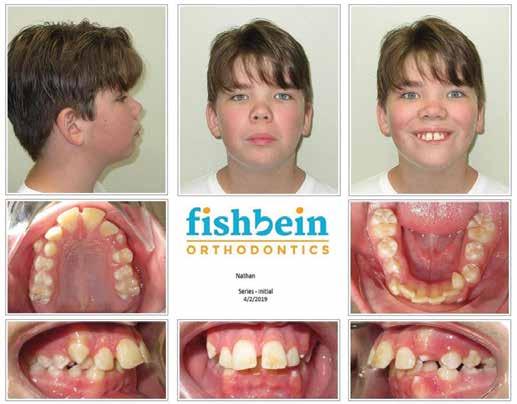
6 minute read
Treating Special Needs Patients Under the Americans with Disabilities Act
By Deborah Minnis
The Americans with Disabilities Act (the Act) was signed into law in 1990, and was amended in 2008, increasing the types of conditions covered by it. In Aug. 2022, the American Dental Association (ADA) clearly stated its support of the Act and the ADA’s commitment to ensure equity in providing oral health care to patients with disabilities. This article will give you a brief overview of the applicable provision of the Act and some key areas to focus on for purposes of compliance.
The Act consists of three parts: Title I for employers with 15 or more employees; Title II for governmental entities; and Title III for places of public accommodation. I will be discussing Title III.
Title III – Places of public accommodation. Do not be fooled by the use of the word “accommodation.” Under this law, the definition is much broader than one would think. Any
It is safe to say that the Americans with Disabilities Act is here to stay. If you have not yet treated a special needs patient, now is the time to put protocols in place to handle such a situation. ”
entity that provides goods and services to the public is considered a public accommodation. For example, in addition to hotels, motels, and lodging establishments, the following entities are considered places of public accommodation:
n Restaurants, bars, or other establishments serving food or drink;
n Motion picture houses, theaters, concert halls, stadiums or other places of exhibition or entertainment;
n Bakers, grocery stores, clothing stores, hardware stores, shopping centers or other sales or rental establishments;
n Professional offices of a healthcare provider, hospitals, insurance offices, lawyer offices;
n Laundromats, dry-cleaners, banks, barber shops, beauty shops, travel services, shoe repair services, funeral parlors and gas stations.
This is not an exhaustive list but is intended to illustrate the wide range of businesses covered under Title III of the Americans with Disabilities Act. As you can see, professional offices of healthcare providers are considered places of public accommodation under this Act.
What does Title III of the Act generally prohibit?
The law itself specifically reads: “No individual shall be discriminated against on the basis of disability in the full and equal enjoyment of the goods, services, facilities, privileges, advantages or accommodations of any place of public accommodation by any person who owns, leases (or leases to), or operates a place of public accommodation.” Discrimination can come in the form of (1) denial of benefits, (2) providing unequal benefits, or (3) providing separate or different benefits to disabled individuals from those offered to abled individuals.
How is the Act being implemented and what are some major areas of concern?
The federal Department of Justice (DOJ) was tasked with implementing Title III of the Act. The DOJ has developed extremely detailed rules and regulations relating to removal of the physical barriers to access. Because these regulations have been in place since 2008, most construction and significant renovations since that time have been done in compliance with these regulations.
Physical barriers are generally easier to identify and correct – making accommodations for barriers that are less easily identifiable is more challenging. More recently, major areas of litigation seem to center around such barriers, i.e., use of service animals, failure of the healthcare provider to provide auxiliary aids or services to facilitate equal access to the goods or services and website inaccessibility. Below is a brief discussion of each area.
Service Animals - Dogs are the only animals recognized as service animals under the Act. Under the Act, the definition of service animal does not include emotional, companion, or comfort animals. The service dog must be individually trained to do work or perform tasks for an individual with disabilities. The tasks performed by the dog must be directly related to the individual’s disability. For example, for a person with diabetes, the dog may be trained to alert when the person’s blood sugar reaches a high or low level.
Auxiliary Aids – The Act requires the provision of auxiliary aides and services to assist those individuals who are vision, hearing or speech impaired. The law requires that appropriate auxiliary aides must be provided where they are necessary to ensure effective communication. Appropriate auxiliary aids can include, but are not limited to, qualified sign language interpreters, qualified note takers, video remote interpreting systems, computer-aided transcription services, written materials in Braille or large print, qualified speech-to-speech interpreters, and the exchange of written notes. The method of communication used must be appropriate under the circumstances. To determine effectiveness, the length, nature, complexity and context of the communication has to be considered. The method of communication normally used by the patient must also be considered.
The issue raised most frequently in litigation is when an in-person American Sign Language interpreter must be provided. These inquiries are very fact intensive. As a rule of thumb, the more complex or complicated the procedure or treatment is, the more likely the use of an in-person interpreter will be deemed necessary.

Website Accessibility – On March 28, 2022, the DOJ issued guidance on website accessibility under the Act. These regulations expressly apply to medical offices. The DOJ did not set out detailed regulations in this area in the manner it did with removal of physical barriers; instead, businesses have flexibility in meeting this standard. The DOJ identified the technical standards developed under the Web Content Accessibility Guidelines (WCAG) as helpful guidance to ensure compliance. The most recent version of the WCAG, WCAG 2.1, is now available. It is important to note that though the DOJ has allowed businesses flexibility in this area, it has made it a priority in its enforcement efforts, and compliance is still required. Businesses must ensure that their websites are accessible. Conclusion – It is safe to say that the Act it is here to stay. If you have not yet treated a special needs patient, now is the time to put protocols in place to handle such a situation. The more information you have in advance, the better you can make the experience for your patients and staff. If you have treated a special needs patient, you should review that experience and determine whether the protocols used were adequate or need to be revised. In addition, as with any law, there are people and groups who will test a company’s implementation of its provisions. It is better to be proactive than reactive.

Do You Know Someone Who Could Be Interested in Becoming a BOD Member?
By Casey Stoutamire, FDA Director of Third Party Payer and Professional Affairs
Did you know there is currently one open position on the Florida Board of Dentistry (BOD)?
A consumer position is still vacant. The BOD is responsible for licensure, monitoring and ensuring the safe practice of dentists and dental hygienists in their service to the people of the state. The BOD consists of 11 members appointed by the governor and confirmed by the Florida Senate. Seven members must be licensed dentists actively engaged in clinical practice; two members must be actively practicing dental hygienists; and two members must be consumers employed in a field or occupation that is not related to the dental profession. The BOD meets four times a year at various locations around the state and the various committees and councils meet via conference call in between those meetings.
If you know of someone who would be a good consumer member, flhealthsource.gov/ board-memberscontains material that provides insight into the duties and responsibilities of the role.
For further questions, please contact FDA Director of Third Party Payer and Professional Affairs Casey Stoutamire at 850.350.7202 or cstoutamire@floridadental.org.











